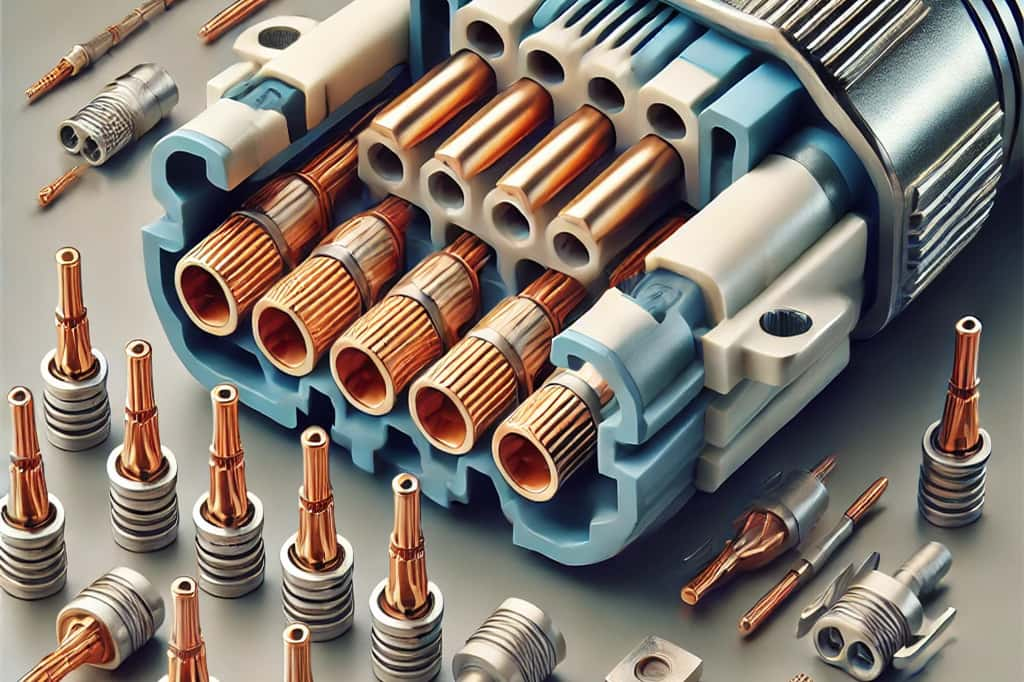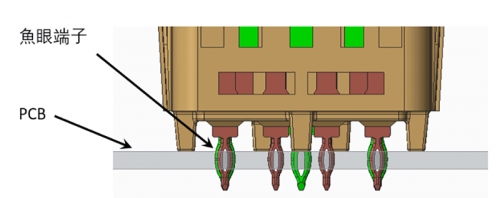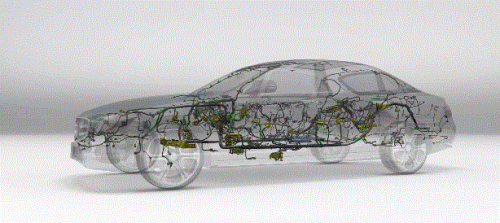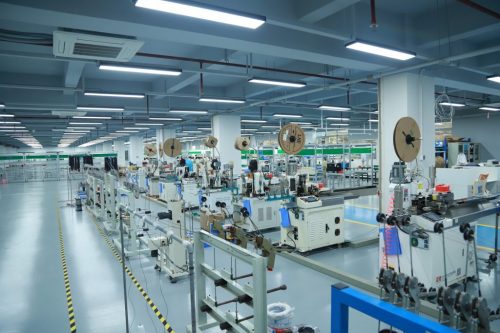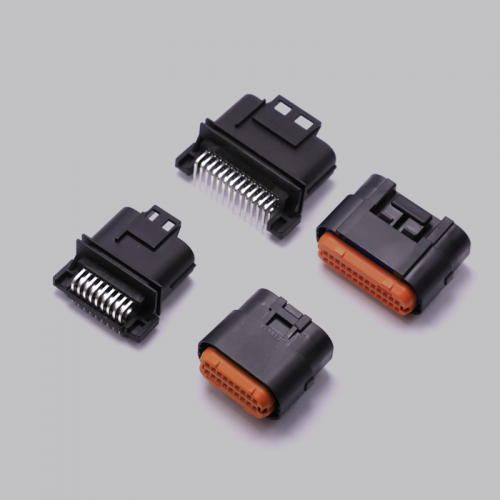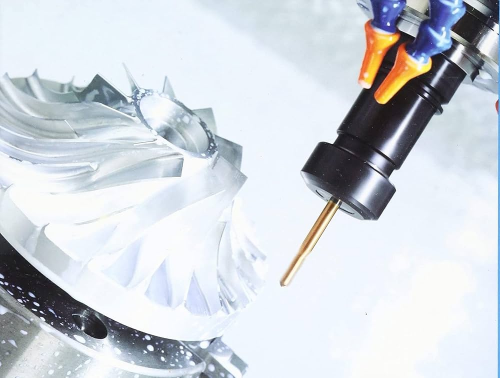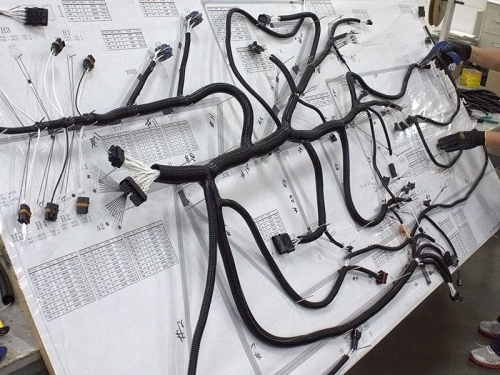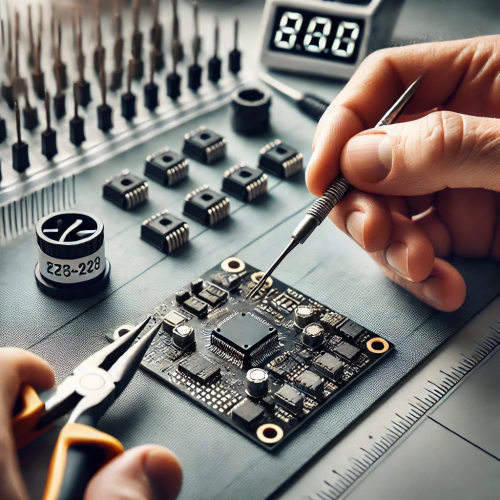In the world of modern electronics, the electronic connector plays a vital role. Whether it’s for smartphones, computers, or industrial equipment, connectors are the key to transferring electrical power and signals. Choosing the right materials directly impacts the performance, durability, and reliability of the connector. Therefore, understanding the common materials used in electronic connectors and their properties is crucial for designing and using electronic products effectively.
c
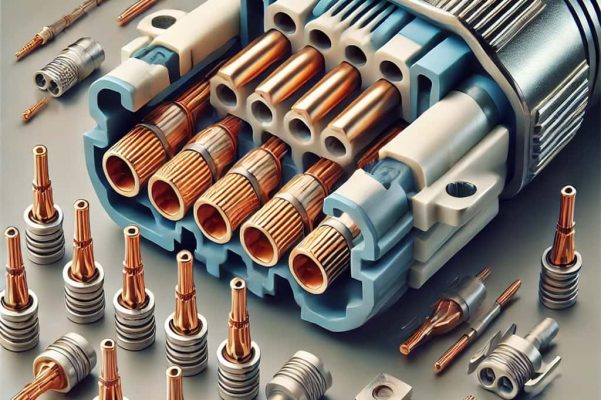
1. The Basic Structure of an Electronic Connector
Before discussing materials, it’s important to understand the basic structure of an electronic connector. Generally, an electroic connector consists of two main parts:
Contacts: These are the core of the connector, responsible for the transmission of electrical current and signals.
Housing (Shell): The housing protects the contacts and provides mechanical strength and environmental protection.
The choice of materials for these parts directly affects their performance.
2. Common Materials for Contacts and Their Properties
Contacts are the most critical part of an electronic connector, as they are responsible for electrical contact with conductors. The materials used for contacts need to offer good conductivity, corrosion resistance, and mechanical strength.
2.1 Copper and Its Alloys
Copper and its alloys are the most common materials used for electronic connector contacts. They include brass, bronze, and phosphor bronze. Copper offers excellent electrical conductivity, making it the preferred choice for electrical connectors. Here are the characteristics of common copper alloys:
Brass: Brass is an alloy of copper and zinc, offering good conductivity and workability. It is widely used in various connectors due to its cost-effectiveness. However, brass has lower corrosion resistance, so it often requires a protective coating.
Bronze: Bronze, an alloy of copper and tin, has better mechanical strength and corrosion resistance than brass. It is ideal for applications requiring higher mechanical stress.
Phosphor Bronze: Phosphor bronze, a type of bronze alloy, contains a small amount of phosphorus to improve wear resistance and elasticity. It is commonly used in spring-loaded contacts like pins and sockets, providing excellent performance in high-cycling environments.
2.2 Beryllium Copper
Beryllium copper is another high-performance material used for demanding connector applications. Its main properties include:
Excellent conductivity: Beryllium copper offers conductivity almost as good as pure copper, combined with high strength and elasticity. It is suitable for precision applications and connectors that require frequent connection and disconnection.
Superior corrosion resistance: Beryllium copper performs well in harsh environments, such as moisture and corrosion-prone areas, making it ideal for waterproof connectors used in outdoor or marine equipment.
Beryllium copper is often used in applications where high reliability is essential, such as in aerospace and telecommunications.
2.3 Precious Metal Plating
To further enhance the performance of contacts, especially in harsh environments, precious metal plating is often applied. This includes gold, silver, or palladium coatings. The role of these coatings is to improve corrosion resistance and conductivity.
Gold plating: Gold provides excellent oxidation and corrosion resistance, making it a common choice for high-end connectors. Gold also has very low contact resistance, which is critical for stable signal transmission. However, gold is expensive, so it is usually applied in thin layers on the contact surface.
Silver plating: Silver offers better conductivity than gold, though it is less resistant to oxidation. Silver plating is used where high conductivity is needed in relatively mild environments.
Palladium plating: Palladium is highly resistant to corrosion, particularly in industrial environments, and is often used for connectors in china new energy connectors, where durability and performance are crucial.
3. Common Housing Materials for Connectors
The housing of an electronic connector not only provides mechanical support for the contacts but also needs to be resistant to heat, corrosion, and sometimes electrical insulation. Depending on the application, connector housings are typically made of metal or plastic materials.
3.1 Metal Housings
Metal housings are commonly used in applications where higher mechanical strength and electromagnetic shielding are required. Typical metals used include aluminum alloys and stainless steel.
Aluminum alloys: Aluminum housings are lightweight and corrosion-resistant, with good workability. Due to their low density, aluminum is ideal for devices where weight is a concern, such as portable electronics or china connector corporation products designed for energy-efficient systems.
Stainless steel: Stainless steel housings provide excellent corrosion resistance and high mechanical strength, making them suitable for rugged environments like outdoor equipment or high-humidity settings.
3.2 Plastic Housings
For many consumer electronics and some industrial applications, plastic housings are more common. Plastic housings are lightweight, cost-effective, and easily mass-produced. Common plastics include polycarbonate (PC), nylon (polyamide), and polypropylene.
Polycarbonate (PC): PC plastics are highly impact-resistant and heat-resistant, making them suitable for high-temperature environments. PC also offers good electrical insulation, perfect for housing connectors that need electrical protection.
Nylon: Nylon provides excellent wear resistance and chemical stability, as well as flexibility. It is often used in industrial equipment connectors that are exposed to frequent mechanical stress.
Polypropylene: Polypropylene has good chemical resistance and is highly affordable, making it a popular choice for general consumer electronics.
4. Importance of Material Selection for Electronic Connectors
Selecting the right materials is crucial to the overall performance of an electronic connector. Different materials provide varying levels of conductivity, corrosion resistance, mechanical strength, and environmental durability. Here are some key factors to consider when choosing materials:
4.1 Environmental Requirements
If the connector will be used in harsh environmental conditions, such as high humidity, salt spray, or extreme temperatures, the material’s resistance to corrosion and durability is critical. For example, beryllium copper and precious metal plating excel in such environments, while stainless steel and nylon housings offer good protection for connectors in waterproof connector applications.
4.2 Conductivity and Signal Transmission
For applications requiring high-frequency or large current transmission, materials with superior conductivity, like copper, beryllium copper, or gold plating, are ideal. These materials ensure low resistance and stable signal transmission, reducing energy loss and interference.
4.3 Mechanical Strength and Durability
In high-stress environments, such as those with frequent plugging and unplugging or exposure to mechanical vibrations, the mechanical strength of the material becomes critical. Bronze and phosphor bronze offer excellent elasticity and tensile strength, making them perfect for extending the life of the connector.
Conclusion: Materials Science Enhances the Reliability of Electronic Connectors
The choice of materials for electronic connectors not only determines the product’s performance but also affects its cost, durability, and suitability for various applications. Understanding the characteristics of these materials helps users choose the most appropriate product and ensures optimal performance in different environments.
Whether using copper alloys for contacts or stainless steel or plastic for housings, proper material selection enhances the reliability and longevity of the connector. If you’re interested in learning more about our products or need solutions tailored to specific applications, visit our website to explore the full range of china new energy connector products and more.
